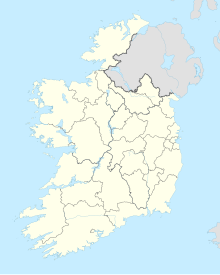Airport in County Donegal, Ireland
| NAS Lough Foyle | |
|---|---|
 US NAS Lough Foyle (UA 557.05 Marian Shippey Cote Collection) US NAS Lough Foyle (UA 557.05 Marian Shippey Cote Collection) | |
| Summary | |
| Airport type | Military |
| Operator | United States Navy |
| Location | Lough Foyle, near Quigley's Point, County Donegal, Ireland |
| Built | 1918 (1918) |
| In use | 1918–1919 (1919) |
| Elevation AMSL | 3 ft 3 in ft / 1 m |
| Coordinates | 55°06′15″N 007°12′47″W / 55.10417°N 7.21306°W / 55.10417; -7.21306 |
| Map | |
 | |
U.S. Naval Air Station Lough Foyle was a seaplane station at Lough Foyle in Ireland, which was operated by the United States Navy (USN) and commissioned on July 1, 1918 with Commander Henry D. Cooke, USN as the commanding officer. Located near Quigley's Point in County Donegal, and approximately 6 miles (9.7 km) north of Derry in County Londonderry, the station was disestablished in early 1919.
History
At the start of United States of America's involvement in the First World War, five sites in Ireland (Queenstown, Wexford, Lough Foyle, Whiddy Island and Berehaven) were identified to be operated by the United States Navy in support of allied operations against enemy submarines.
Local Irish labor and American construction teams worked on the site, building a control tower that still stands, accommodation and workshops, and a concrete slipway for beaching the aircraft – this is still in existence.
Aircraft
In July 1918, the first Curtiss H-16 flying boats arrived in Londonderry. These had been stripped down and had to be re-assembled, a task completed by August 22, when training began. On September 1, 1918, the base became operational. Between September 3 and November 6, the flying boats completed 27 patrols – flying was possible only on 31 days. The longest patrol, on October 24, was over six hours.
Operations
On October 19, 1918, while escorting a 32-ship convoy in the Lough Foyle sector off the north coast of Ireland, ENS George S. Montgomery sighted and successfully attacked an enemy submarine stalking the convoy. His bombs hit within 30 feet of the periscope and brought heavy turbulence and oil to the surface. For “probably damaging” the submarine and saving the convoy from attack, he was officially commended.
End of hostilities and closure
With the end of the war, the U.S. Naval Air Stations in Ireland were no longer required. The Anti-submarine warfare patrols were discontinued and the aircraft were grounded and disarmed as NAS Lough Foyle closed on 22 February 1919.
See also
- U.S. Naval Air Station Berehaven Ireland
- U.S. Naval Air Station Wexford Ireland
- U.S. Naval Air Station Queenstown Ireland
- U.S. Naval Air Station Whiddy Island Ireland
References
- ^ "New World War I Memorial Unveiled In Inishowen". donegaldaily.com. Donegal Daily. 22 September 2021. Retrieved 29 October 2021.
- Evans, Mark; Grossnick, Roy (November 2015). "US Naval Aviation 1910-2010 Vol 1, Chapter 2, Page 46" (PDF). Naval History & Heritage Command, Department of the Navy. Retrieved 21 April 2018.
- ^ Sitz, W.H. (1930). A History of U.S. Naval Aviation (PDF). Washington DC: U.S. Government Printing Office. p. 27.
The station at Lough Foyle was located on a long narrow arm of the sea on the north coast of Ireland about 6 miles north of the town of Londenderry
- "U.S. Naval Air Station, Lough Foyle, Ireland". history.navy.mil. U.S. Navy. Retrieved 29 October 2021.
The Northern Ireland station, located between County Londonderry and County Donegal was disestablished in February 1919
- ^ Doherty, Richard (11 November 2015). "Over Here!". Londonderry Sentinel. Retrieved 5 December 2016.
- Van Wyen, Adrian O. (1969). Naval Aviation News NAVAL AVIATION IN WORLD WAR I (PDF). Washington DC: THE CHIEF OF NAVAL OPERATIONS. p. 88. Retrieved 3 March 2013.
- Tillotson, C.B. (1 January 1919). U.S. Naval Air Station Wexford, Ireland. United States Navy.
- "World War I Era Naval Aviation Stations". BlueJacket.com. BlueJacket.com. Retrieved 1 April 2018.